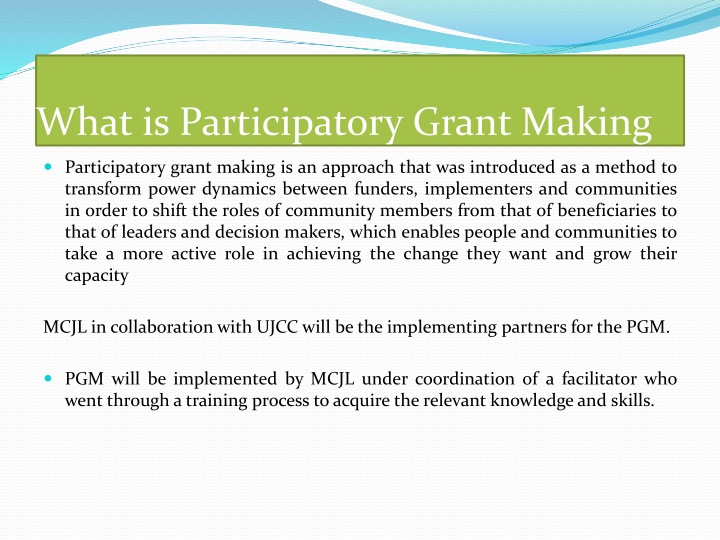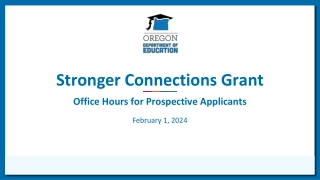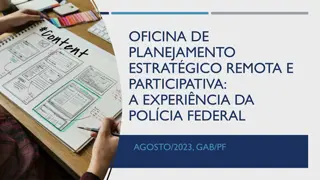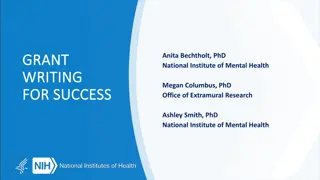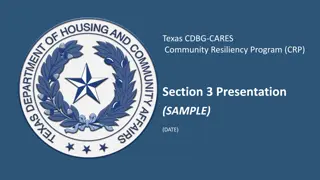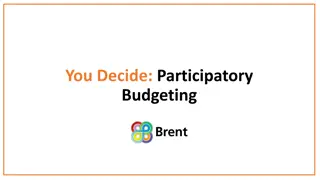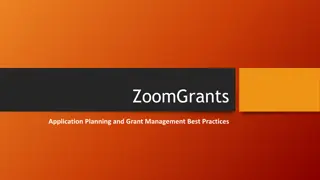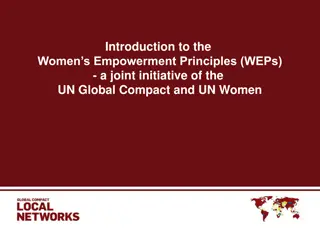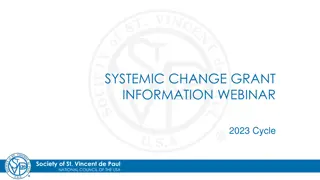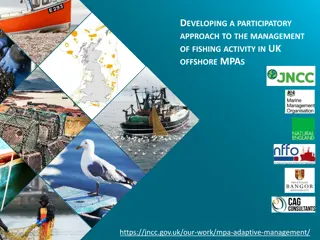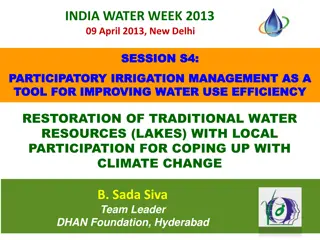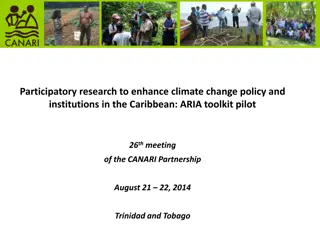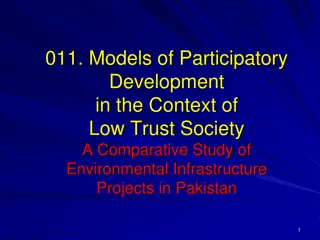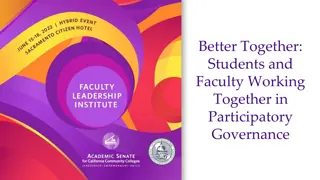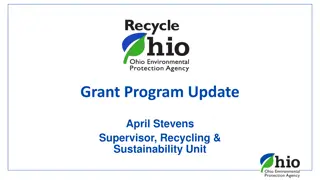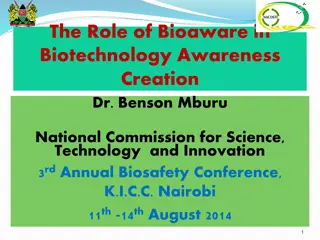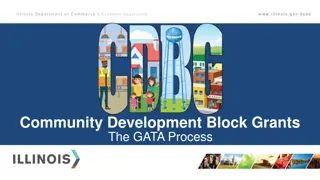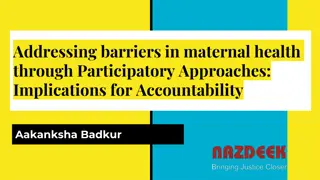Transformative Approach: Participatory Grant Making for Community Empowerment
Participatory grant making (PGM) is a method aimed at reshaping power dynamics within funding processes, shifting community members from beneficiaries to decision-makers. MCJL and UJCC collaborate to implement PGM, enabling community-led initiatives for change and capacity building. Through a facilitated process involving mapping, proposal development, group selection, and contractual obligations, PGM empowers communities in Bugiri district, fostering interfaith development initiatives through stakeholder engagement and equitable resource allocation.
Download Presentation

Please find below an Image/Link to download the presentation.
The content on the website is provided AS IS for your information and personal use only. It may not be sold, licensed, or shared on other websites without obtaining consent from the author.If you encounter any issues during the download, it is possible that the publisher has removed the file from their server.
You are allowed to download the files provided on this website for personal or commercial use, subject to the condition that they are used lawfully. All files are the property of their respective owners.
The content on the website is provided AS IS for your information and personal use only. It may not be sold, licensed, or shared on other websites without obtaining consent from the author.
E N D
Presentation Transcript
What is Participatory Grant Making Participatory grant making is an approach that was introduced as a method to transform power dynamics between funders, implementers and communities in order to shift the roles of community members from that of beneficiaries to that of leaders and decision makers, which enables people and communities to take a more active role in achieving the change they want and grow their capacity MCJL in collaboration with UJCC will be the implementing partners for the PGM. PGM will be implemented by MCJL under coordination of a facilitator who went througha training process toacquire the relevant knowledge and skills.
Methodology/Procedure Mapping MCJL in collaboration with UJCC identified groups to participate in the PGM through mapping process that involved partnership assessment of stakeholders in the district which supported the identification process. Proposal Development The identified groups developed proposals to decide on what interfaith development initiatives are required in theircommunities. The proposals were vetted through collaborative analysis process where a criteria that was discussed and agreed upon by the groups was used to chose the best 5 proposals.
Group Composition 5 groups were selected to implement the PGM including Katwisanye group(14) , Restoring community Vision group(10), Muyenga group(10), Alinyikila(20) and Devine youth group(10). All these groups are located in Bugiri district which is one of JISRA implementing districts for MCJL. In terms of disaggretion PGM RELIGION 16 14 12 10 8 RELIGION DISAGREGATION RELIGION MUSLIM 6 RELIGION DISAGREGATION RELIGION CHRISTIAN 4 2 1 0 ALINYIKILA DEVINE RCV MUYENGA KATWISANYE
Disaggregation AGE SEX 25 16 14 20 20 12 15 10 SEX DISAGREGATION OF GROUPS SEX MALE 8 10 10 6 7 5 SEX DISAGREGATION OF GROUPS SEX FEMALE 4 6 6 5 4 0 3 0 3 3 3 2 2 2 0 ALINYIKILA DEVINE MUYENGA KATWISANYE RCV 0 AGE CATEGORY OF GROUPS AGE 18-25 AGE CATEGORY OF GROUPS AGE 26-30 AGE CATEGORY OF GROUPS AGE 31-35
Contractual Obligations ARLPI is the grants coordinating partner at national level for the PGM and MCJL will sign a contract with ARLPI to establish binding obligations by both parties. The groups will also sign individual contracts with ARLPI prior to funds being disbursed to their accounts for PGM implementation. The groups will be awarded a grant amounting to 12,900 EUR amounting to 51,361,995 UGX. A due diligence exercise was conducted by the PGM taskforce and the grant coordination partner, ARLPI to confirm legitimacy of the groups.
Proposed Group Activities Alinyikila group(11,430,000) Conducting peace building sessions with the youths Conduct a mentoring of youth on cooperation and unity between youth from the different faiths Conduct dialogues between youth and community leaders Sensitize local community members for practice change Build capacity of youth in hands on skills of energy stove making to build livelihoods Conduct community gala to raise awareness on FoRB and exhibit interfaith collaborations Devine Youth Group. (11,570,000) Conducting interfaith discussion between the youth from different sects, community leaders, and security among others to learn about each other s religious beliefs and how they influence their interactions together. Conduct interfaith dialogue between community members and victims of religious violence in the selected communities. Conducting youth peace day of service sessions with the youth from different sects to bring together youth for community clan up while spreading messages of peace.
Activities continued Katwisanye Group (11,525,000sh) Conduct community outreach sessions to sensitise communities about bad religious and cultural practices and believes that affect women girls Conduct meeting with community leaders to discuss HTPS that affect women from practicing their religion and how to address and respond to victims. Conduct life skills training on how to save to build capacity for livelihoods to support addressing of HTPs that affect women and girls Restoring Community Vision group (RCV) 8,295,000sh Interfaith and inter cultural dialogue & workshops with religious leaders, cultural leaders, security actors, followers of the different sects Conducting of one Radio talk shows and 3 community radio plays to sensitize the community about interfaith/intercultural co-existence Conduct drama sessions on unity in diversity with women leaders to support them in addressing HTPS in their community conduct a one day inter-faith and inter-cultural community gala in the community involving debate and foot ball match for peace building to foster faith collaborations
Activities Muyenga Group 8,055,000sh Mobilization and identification of women religious leaders from the different religions. Conduct drama sessions on unity in diversity with women leaders to support them in addressing HTPS in their community Conduct community gala to show case different works by women in community as a method of exhibiting unity among women from different religions. Conduct dialogue with ale religious leaders to facilitate recognition of women leadership and address HTPS that affect them at religious institution level. Conduct training sessions in life skills and mind set change to foster unity and interfaith collaborations Challenges The district leaders had different expectations about the PGM. They wanted to influence group selection and category of groups to be supported. A dialogue was conducted to harmonise the situation.
Achievements MCJL in collaboration with UJCC successfully identified and mobilized youth groups to suit the category and requirements of the PGM guidelines. Community participation and awareness about FORB has been achieved. The relationship with the district stakeholders has been strengthened through the collaborative process of identification of the groups and community engagement. Youth have been supported with capacity to enable them make sound decisions about what is required to address community problems related to interfaith issues. The groups have also been capacitated with knowledge on how-to develop proposals that can enable them to win grants in future as resource mobilization tool. Collaboration between UJCC and MCJL has also been strengthened as JISRA implementing partners to address FORB related interfaith challenges in the communities.
